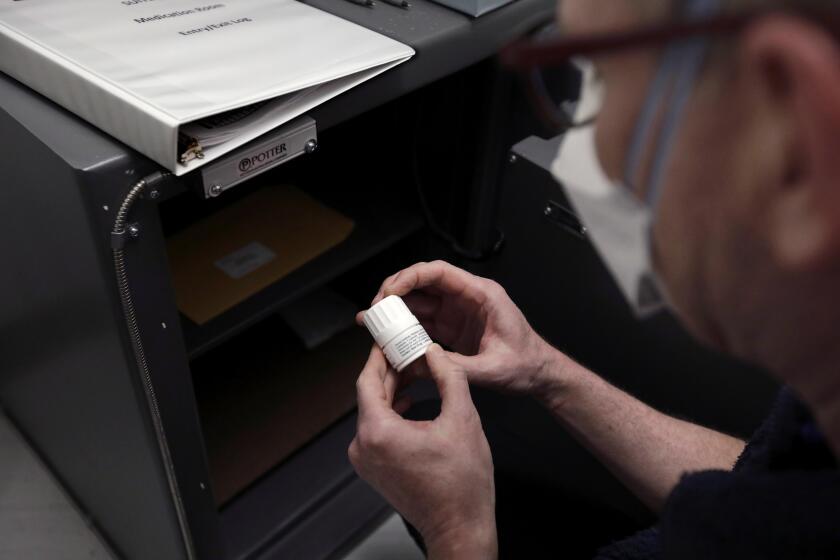‘We’re all victims when a kid turns on.’ : When the Kids Stop Laughing
It was their first confrontation with the law, but a detective predicted with reasonable certainty that one of them would be back. There were two girls and a boy, all under 15, too young by any standard to be facing an unsmiling narcotics officer across a wooden table and listening to the details of their crimes with the intensity of children at a movie.
But this was no movie and these three, by the simple expediency of drug abuse, had ceased to be children.
They had become statistics in the frightening incidence of narcotics arrests among students in America’s schools, a computer-logged warning of what the future might hold in the burnt-hemp aromas that drift across the campuses and in the cocaine-snow that dusts the playgrounds.
All three had been arrested for possession of narcotics, one of them for possession with intent to sell. The drugs in this case had been marijuana and coke, but the thousand or so juveniles arrested each year in the Valley don’t stop with those. Acid and “angel dust” appear among the affluent with the same terrible consistency that marks their use in the ghettos.
Sgt. Charles Smith, who heads the Valley’s Juvenile Narcotics Bureau, let me listen in as the three young people were brought to face consequences ranging from outright release to a court hearing and possible detention.
“I’ve seen them as young as 6 come through those doors,” he said gesturing toward the entryway of Room 325. “But they’re usually around 12 or 13. Dope is called a victimless crime, but it isn’t. Parents suffer as much as the children. We’re all victims when a kid turns on.”
An incident has brought the problem close to me. In the past several months I have seen a boy I have known since his infancy change from a bright young man, full of life and laughter, into a vague and blurry addict.
I have seen the energy of youth drain from him like light fading from the eyes of a dying man. I have seen the guileless honesty of childhood strangled by the necessity to lie and steal in order to perpetuate his drug habit. I have heard his laughter choked off by the dulling effects of enough hash-powered highs to turn his brain to mush.
And it has pained me more than I can say.
Youth ought not to be walking in a dream. Youth should be alive and running, every instinct alert to the world that flows and snaps and whirls around it, breathless from the wind in its face, tasting the distance, hearing bugles.
It should not be in a pale green room of the Juvenile Narcotics Bureau witnessing what could be the slow unwinding of lives just barely begun. But it was.
The three I heard were Judy, Ron and Pam. Judy had been caught with marijuana, cocaine and codeine pills. She readily admitted using drugs several times a week, after at first lying that the bindles of white dust found in her purse were baking soda.
She used them, she said, because they made her feel good.
Her attitude toward being caught was arrogance. She didn’t believe it would happen again. The interviewing officer, Detective John Walker, a large, solemn man, observed her without smiling.
“You’re going to get caught,” he said. “No question about it.”
He placed her on probation and predicted she would be back.
Ron was arrested with 13 joints in his wallet. At first, he denied knowing how they got there. Then he said he had found them, later that he had picked them up when someone else threw them away.
“You said earlier an old man had sold them to you for $15,” Detective John Whipp reminded him.
The boy shrugged.
“Everyone finds them,” Whipp said wearily. “You’re only 15. Something has to change.” Probation.
Pam was last. At 14, she is pretty enough to be a model. Long dark hair, large green eyes, clear skin. She was arrested with six joints and admitted smoking dope twice a week and giving it to her friends. She couldn’t answer why. She just did.
Walker spoke to her longer than the others. Her arrest had cost her a school office she had won by election. She was a bright girl who understood what she had done and was angry with herself. Her eyes misted as the detective discussed the possible consequences.
Finally he said in the same grave tone from the same unsmiling face: “I’m going to let you go, but I can only do that once. Everyone deserves a break. This is yours.”
“There are only seven of us,” Sgt. Smith would say later, “and thousands of them. We do what we can. I’ve seen three or four OD. But some who do make it come back once in a while to say thanks.
“It isn’t all their fault. Hell, they see their heroes doing the same things. You know what I wish? When people get new cars, they know every dent and scratch in them. I just wish they knew as much about their own kids.”
Across the room, as Pam left, Detective Walker leaned in close and half-whispered, “Make it.”
She didn’t respond.



